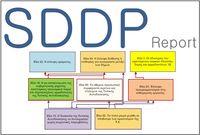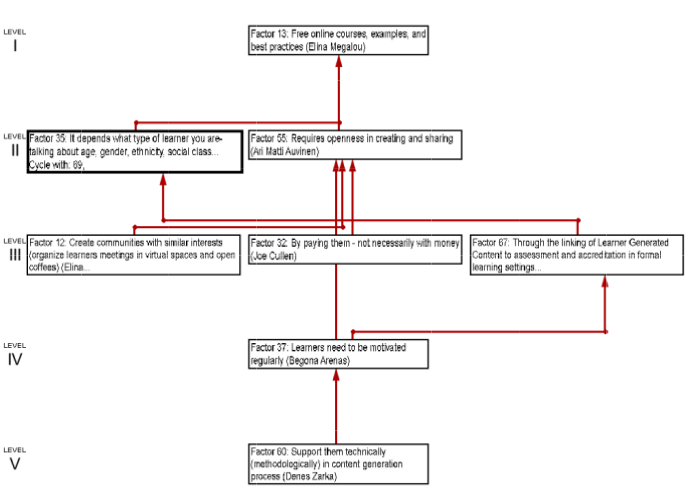E-Hoop SDDP Lithuania: Difference between revisions
Chrystalla (talk | contribs) (Created page with "{{SDD_Report <!-- The name of the template --> |acronym=E-Hoop SDDP Lithuania <!-- Append to variable acronym the co...") |
|||
| (3 intermediate revisions by 2 users not shown) | |||
| Line 1: | Line 1: | ||
{{SDD_Report | {{SDD_Report | ||
|acronym=E-Hoop SDDP Lithuania | |acronym= E-Hoop SDDP Lithuania | ||
|book_image=SDDP_Report_Image.jpg | |book_image=SDDP_Report_Image.jpg | ||
|report_title= [[SDDP e-Hoop]] | |report_title= [[SDDP e-Hoop]] | ||
|Triggering_Question= "What are the learning difficulties encountered by students?" | |project= [[E-Hoop]] | ||
| | |Triggering_Question= "What are the learning difficulties encountered by students?" | ||
|author= [[Elena Aristodemou]]<br> [[Aliki Economidou]] <br> [[Chrystalla Miltiadou]] | |location= Kaunas, Lithuania | ||
|editor= [[Yiannis Laouris]] | |dates= 6 January 2014 | ||
|total_duration=12 person hrs | |LeadFacilitator= [[Katerina Fotiou]] <br> [[Yiannis Laouris]] | ||
|stats=Participants=34 <br> Number of ideas=44 <br>Number of Clusters=7 <br> Ideas received Votes=36 <br> Ideas on MAP R=8 <br>Spreathink ST=79% <br>Situational Complexity SCI=6,6% | |AsFacilitator= | ||
| | |author= [[Elena Aristodemou]]<br> [[Aliki Economidou]] <br> [[Chrystalla Miltiadou]] | ||
|link=http://www.e-hoop.info/ | |editor= [[Yiannis Laouris]] | ||
|total_duration= 12 person hrs | |||
|stats= Participants=34 <br> Number of ideas=44 <br>Number of Clusters=7 <br> Ideas received Votes=36 <br> Ideas on MAP R=8 <br>Spreathink ST=79% <br>Situational Complexity SCI=6,6% | |||
|isbn= | |||
|link= http://www.e-hoop.info/ | |||
}} | }} | ||
| Line 16: | Line 20: | ||
==Executive Summary== | ==Executive Summary== | ||
The Structured | The [[Structured Democratic Dialogue]] [[Co-Laboratory|co-laboratories]] were organized with aim to analyze the needs of the intended users with respect to their learning needs, as well as their needs with regards to the [[E-Hoop]] project platform. The intention was to identify obstacles that prevent learners from benefiting maximally from their current educational institution due to differences (disabilities, socioeconomic background etc.). | ||
The [[Youth Career and Advising Center]] (JKC) organized on the 6th of January 2014 a [[Co-Laboratory]] in order to accumulate the collective wisdom of experts regarding the means that learners can be supported to generate learning content. The [[Co-Laboratory]] was attended by 34 international researchers, experts and decision makers. The process was supported by [[Cogniscope 3]]. | |||
| Line 50: | Line 55: | ||
The workshop was mainly facilitated by [[Yiannis Laouris]] and [[Katerina Fotiou]] ([[Cyprus Neuroscience and Technology Institute |CNTI]]). | The workshop was mainly facilitated by [[Yiannis Laouris]] and [[Katerina Fotiou]] ([[Cyprus Neuroscience and Technology Institute |CNTI]]). | ||
In sum, the participants of the dialogue reported their satisfaction that they had the opportunity to exchange ideas via the structured dialogue process which empowered them to identify and understand the dangers of Internet use. <br> | In sum, the participants of the dialogue reported their satisfaction that they had the opportunity to exchange ideas via the structured dialogue process which empowered them to identify and understand the dangers of Internet use. <br> | ||
==Participants== | ==Participants== | ||
| Line 61: | Line 66: | ||
|- | |- | ||
|Živilė Nagienė | |Živilė Nagienė | ||
|- | |||
|Aldona Širvinskienė | |Aldona Širvinskienė | ||
|- | |- | ||
| Line 126: | Line 132: | ||
|} | |} | ||
<br> | <br> | ||
Latest revision as of 02:38, 25 July 2023
|
Executive Summary
The Structured Democratic Dialogue co-laboratories were organized with aim to analyze the needs of the intended users with respect to their learning needs, as well as their needs with regards to the E-Hoop project platform. The intention was to identify obstacles that prevent learners from benefiting maximally from their current educational institution due to differences (disabilities, socioeconomic background etc.).
The Youth Career and Advising Center (JKC) organized on the 6th of January 2014 a Co-Laboratory in order to accumulate the collective wisdom of experts regarding the means that learners can be supported to generate learning content. The Co-Laboratory was attended by 34 international researchers, experts and decision makers. The process was supported by Cogniscope 3.
The Triggering Question (TQ) of the first workshop was:
"What are the learning difficulties encountered by students?"
In response to the TQ, the 34 participants came up with 44 ideas, which were categorized in 7 clusters. Following the voting process, 36 ideas received one or more votes and were structured to create the influence MAP shown below.
According to the participants of this workshop, the ideas that appear to be the most influential were:
- Idea #36: Ekonomine ir socialine situacija seimoje neleidzia naudotis papildomo mokymosi paslaugomis / Economic and social situation of the family does not allow to take additional learning opportunities
- Idea #6: Tevai nenori matyti ir pripazinti, kad vaikai turi specialiuju mokymosi poreikiu, ir neatlieka testu, kurie padetutai diagnozuoti / Learning disabilities, which parents’ don't want to see, and deny tests to diagnose what are the exact problems
- Idea #14: Tevai uzsienyje / Parents are residing abroad
Idea #38: Mokymosi priemones inovatyvios, taciau nepritaikytos mokiniu gebejimams / Learning resources might be innovative, but they are not adapted to the abilities of students
- Idea #31: Zemas intelektas, specifiniai mokymosi ir raidos sutrikimai / Low intelligence and specific learning and development disorders
- Idea #35: Truksta pagalbos is tevu ir kitu artimuju / Lack of support from family
- Idea #11: 14 Votes) Didelis mokiniu skaicius klasese (pvz. 30 mokiniu) / High number of students in a classroom (i.e. approx. 30 students)
- Idea #43: Kurybiskumo stoka pamokose / Lack of creativity during the lessons
- Idea #30: Diskursija, disgrafija ir kitos mokymosi negales / Dysgraphia and other learning disabilities
- Idea #13: Menki pradiniu klasiu mokiniu socialiai igudziai. / Low social skills of the primary school students
- Idea #10: Didelis mokymosi kruvis / High load of learning
- Idea #1: Besimokantiesiems truksta motyvacijos mokytis / Students lack of motivation for learning
The workshop was mainly facilitated by Yiannis Laouris and Katerina Fotiou (CNTI).
In sum, the participants of the dialogue reported their satisfaction that they had the opportunity to exchange ideas via the structured dialogue process which empowered them to identify and understand the dangers of Internet use.
Participants
| Name |
|---|
| Rasuolė Zederštreimienė |
| Živilė Nagienė |
| Aldona Širvinskienė |
| Rima Rekeltienė |
| Genovaitė Meinorienė |
| Ilona Nutautienė |
| Regina Dirginčienė |
| Audronė Mažeikinė |
| Ingrida Muturė |
| Laimutė Sakalauskienė |
| Simona Gargasienė |
| Rasa Čejauskienė |
| Virginija Dambrauskaitė |
| Saulė Ragulienė |
| Birutė Platakienė |
| Daiva Petrikienė |
| Renata Valantinienė |
| Vida Valančienė |
| Zina Gedrimienė |
| Aušra Skaivydienė |
| Lina Katarskienė |
| Liuda Braslauskienė |
| Irena Liubavičienė |
| Antanas Šiaulys |
| Jūratė Stankaitytė |
| Jūratė Daškevičienė |
| Paulius Januškevičius |
| Jūratė Petkevičienė |
| Vidas Rekešius |
| Renata Miškauskienė |
| Juozas Navickas |
| Loreta Naujalienė |
| Virginija Makaveckienė |
| Daina Gumenienė |

